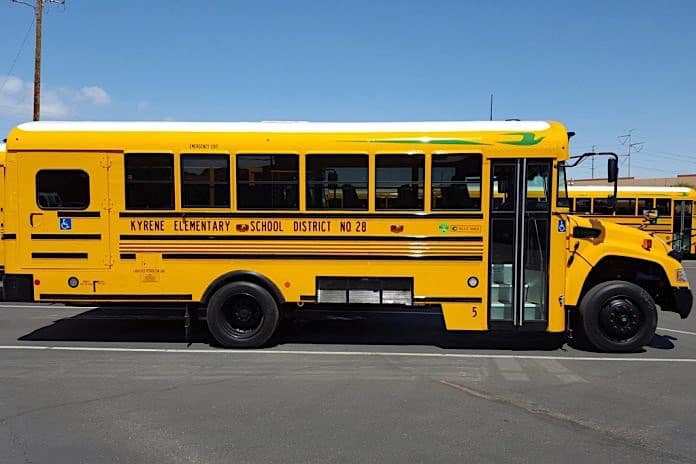A Phoenix-area school district said it expects to by next year to be paying as little as $0.35 per gallon for propane after a new fueling station and fuel tank project is completed.
Kyrene School District in Tempe, Arizona, first began transitioning to propane two years ago with the purchase of 25 Blue Bird Vision Propane school buses. By the end of June, the district will add another 85 propane buses to the fleet, said Eric Nethercutt, director of facilities and transportation.
The remaining 20 buses of the total 130-bus fleet will continue to be diesel transit buses, Nethercutt added.
He said the switch to propane was a “no-brainer” at first because of the fuel savings, alone, as diesel cost nearly $3 a gallon at the time. Even with current bulk diesel prices at $1.50 a gallon, Kyrene is paying $1.10 per gallon equivalent for propane.
But starting in August, when a new scalable fueling station is completed, Nethercutt said the propane price per gallon is expected to fall to around $0.70 when the district increases its bulk purchases from supplier Ferrel Gas. Nethercutt said at least 9,000 gallons of propane will be delivered week for the new 18,000-gallon storage tank, up from the current delivery of 2,000 gallons for a 4,0000-gallon tank.
The cost will decrease even further when factoring in a federal rebate of $0.36 per gallon.
Another reason propane made sense for Kyrene was because of the recurring issues maintenance staff were having in keeping up with diesel emissions requirements. Nethercutt said the district struggled with bus uptime because mechanics were spending too much time addressing issues with emissions equipment. He pointed out that propane engines run cooler than diesel, require fewer oil filter changes and don’t need crankcase ventilation, diesel particulate filters or diesel oxidation catalysts.
Nethercutt said fleets that are considering propane should understand that miles per gallon achieved with the propane buses averages tends to be lower than diesel – about 4.8 mpg compared to about 5.5 mpg – but that the fuel savings more than make up for it. He added that driving a propane school bus is similar to driving a pickup truck, and that it has a sensitive gas pedal.
“Drivers who think they are in a diesel bus, where you really work the gas pedal, find themselves having to re-learn how to feather the gas on a propane bus,” he said. “Our training department is working with drivers who have received new propane buses and are reviewing our department best practices on how to work the gas pedal on propane versus diesel.
Nethercutt said he considered CNG, but all the area districts he spoke to that were considering CNG were still merely talking about making the transition. Meanwhile, districts that advocated propane had actually already made the move and were reaping the benefits.
Plus, he said that his research found that the the fueling infrastructure and engineering needed to adopt CNG could cost Kyrene between $1 million and $1.3 million. Meanwhile, even with the district purchasing the new propane tank at a cost of $100,000, plus upgrading to a scalable fueling station, paying the project engineers and electricians and expanding the bus parking lot is only expected to cost about $300,000.
He added that this summer the district breaks ground on its new fueling station, which will be able to fuel four buses at a time with an option to add two more dispensers, in addition to expanding the transportation yard’s blacktop for increased parking.














